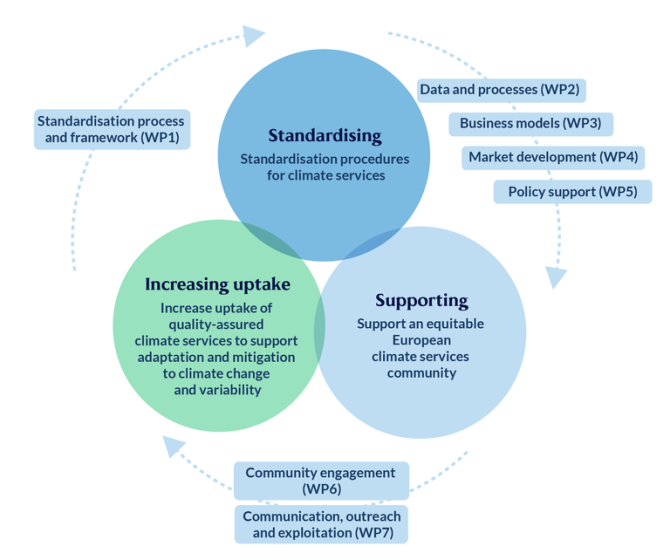
Project
Climateurope2
Supporting and standardizing climate services in Europe and beyond.
Climate services have undergone major development in recent years and are expected to grow rapidly. Consulting companies and government organizations offer climate services so that users can manage climate risks and take advantage of opportunities of climate change. It is sometimes questionable whether the advice provided can pass the test of scientific quality. Also, tools and platforms developed by climate data scientists are often still inaccessible to the average user, difficult to understand or user-unfriendly. Quality assurance, technical standards, guidelines and good practices for climate services can provide the foundation that helps to safeguard the reliability and trustworthiness of the products.
Project aim
Climateurope2 aims to support accessible and well-secured climate services for all sectors of society in the future by:
- Developing standardisation procedures for climate services;
- Supporting an equitable European climate services community;
- Enhancing the uptake of quality-assured climate services to support adaptation and mitigation to climate change and variability.

Activities
To achieve the project objectives, Climateurope2 will use approaches from social sciences and humanities, as well as extensive technical expertise, to build a community of practice for the standardisation of climate services in those cases wherein standardisation is warranted, taking the current fragmentation into account. Analysis of the different climate services components will be conducted, and the results will be then synthesised to prepare standards and recommendations. Co-production and stakeholder engagement in climate services will be addressed through the creation and support of a connected community of European climate services actors.
Uncertainty and climate risk assessment
Wageningen Environmental Research leads the task ‘Uncertainty and climate risk assessment’ (Work Package 2). This task looks at methods and practices for uncertainty and risk assessment methods to enhance the salience of climate services in climate adaptation and the management of climate risks. This includes modelling strategies and methods of uncertainty quantification as well as uncertainties introduced in the processing of data (including bias adjustment) and the impact assessment that underpins climate risk analysis. The task also explores optimal communication approaches to enhance the usability of uncertainty information.
Community engagement
Secondly, Wageningen Environmental Research co-leads a work package on ‘community engagement’ (Work Package 6). It supports the development of the climate service network across Europe to improve connection, engagement and promotion of European climate service activities. This will encourage open exchange of knowledge, expertise and data and provides a science-user communication interface. It will also improve synergies between regional, national, European and international activities.
Dissemination and capacity building
Thirdly, Wageningen Environmental Research contributes to the work package ‘Communication, dissemination and exploitation’ (Work Package 7), especially to dissemination and capacity building.